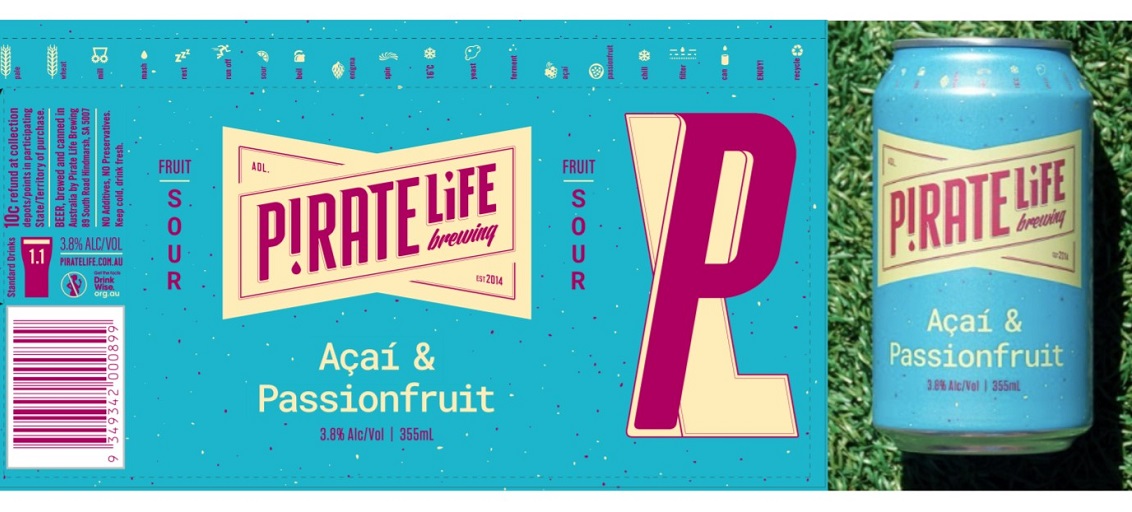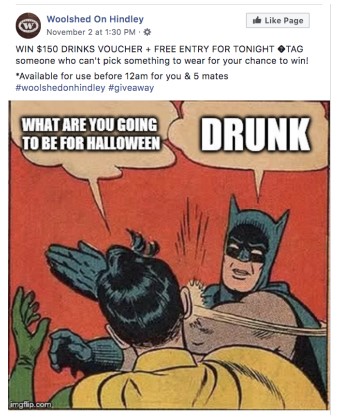
Pirate Life sour beer complaint dismissed by ABAC

Pirate Life Acai & Passionfruit sour packaging pictured in ABAC report
In the latest wave of rulings from ABAC, CUB-owned Pirate Life was again placed in the spotlight after a complaint regarding its Acai and Passionfruit Sour’s packaging asserted that it “could appeal to minors and be confused for juice or soft drink”.
The anonymous complainant said there were no “clear descriptors” that it is a beer product.
Pirate Life responded saying that the Acai & Passionfruit Sour tapped into recent trends for sour beers, which it said are also entering mainstream popularity.
The brewer said that its brand’s visual identity is “so distinctive that this beverage is instantly clear as part of the Pirate Life family of beers”, with prominence given to its abv and the inclusion of the beer brewing process on the can art.
It said the colour palette was “bright, yet mature”, and asserted that acai and passionfruit are “inherently adult” flavours due to their ‘tartness’ and lack of sweet flavouring, meaning they would be less appealling to children.
Pirate Life also said it rejected the idea that soft drinks or juice hold a strong appeal to minors “over and above the appeal they hold for adults”.
“Soft drinks and juice are marketed to and consumed by adults.
“As adults regularly consume a variety of flavoured and/or carbonated beverages, it is inappropriate to assert or imply, as the complainant has done that because a product could ‘be confused for juice or soft drink’ that it necessarily holds some strong and inherent appeal to minors,” it said.
This response was in contrast to the last complaint Pirate Life faced regarding a social media post of a product, which the company later removed.
Part of the ABAC code stipulates that imagery, designs or motifs that “create confusion with confectionary or soft drinks” should not be allowed, a point of contention for many brewers.
In its ruling, the ABAC panel noted that the code “does not contain a specific standard” in relation to identifying a product as an alcoholic beverage, unlike the UK’s Portman Code which stipulates that packaging must clearly establish the drink as alcoholic, but that Pirate Life’s Acai & Passionfruit Sour had met the legal requirement of including abv on the can.
Conversely, the ABAC panel said that while the can’s light blue block colouring is not typical of a soft drink, the can size is the same as soda-type soft drinks, and acai and passionfruit would not immediately be recognised as beer flavours, suggesting it could be a soft drink. It said that the packaging does not clearly establish the product as an alcoholic drink, and the Pirate Life brand is not well known enough that it would be immediately recognised by an average consumer.
Despite this and “on balance”, the panel said the packaging does not have strong or evident appeal to minors. It reasoned that the overall design would not draw the attention of minors, and was quite “sedate” in colouring, although conceding that “it is a very marginal assessment as to whether the product could be confused with a soft drink, and on this point reasonable minds might disagree“.
“The packaging could certainly do more to convey it is an alcohol beverage, but the product doesn’t resemble any immediately recognised soft drink brand or type and on balance is not considered as causing confusion with a soft drink,” the panel said.
As a result, the complaint was dismissed.
ABAC rulings
In addition to Pirate Life, the Jacobs Creek wine brand was the focus of a complaint about its advertising placement in G and PG classified in-flight movies available on Qantas flights.
“It is inappropriate to expose children to alcohol advertisements. It is not permitted on land and there is no conceivable reason why different rules should apply in the air. Regulatory frameworks need to protect children from alcohol advertising in all contexts,” the complainant said.
Jacobs Creek owners Pernod Ricard Winemakers contended that it took all reasonable steps to restrict its advertisement placement before the screening of movies likely to be watched by children on board a flight.
The ABAC panel pointed out that there are no formal restrictions on screening alcohol ads during G or PG movies in Australian cinemas (let alone in-flight moves), and the Australian film classification system is not linked to alcohol advertising restrictions.
It also said that G and PG classifications do not necessarily mean that the show or film is directed at children and that the Qantas flight had a Kid Zone which restricted children to G films and content when it was activated by adults.
It said that the issue was complicated as there were no regulations regarding an issue like this, and that the ABAC code was “not drafted with the workings of Qantas Inflight Entertainment in mind”.
It said that the winemaker did take steps to ensure that it was not screened before a movie directed at children, and so the complaint was dismissed.
A Facebook post by Adelaide CBD hotel the Woolshed on Hindley, which a complainant said was promoting excessive drinking, also faced the panel.
It upheld the complaint, and the company said it has removed the post and will review its social media activity, which ABAC said was a “prudent measure” as the post is “arguably inconsistent” with the company’s obligations under the South Australian liquor licensing scheme.
A ruling concerning a Diageo-owned Bundaberg Rum brand extension in relation to the rum’s branding on Ice Break iced coffee was also made.
The complainant in this case argued that the iced coffee brand, being sold to minors, advertises Bundaberg Rum, even though the product is not alcoholic in itself.
Diageo responded to the complaint saying it is a product designed for adults, with 0.3% abv in compliance with the Food Standards code.
It said the primary audience for the drink is 18-29 year olds, and that social media posts promoting the product were targeted at 18 years and older.
However ABAC said that while it is not an alcoholic beverage, it is considered a brand extension of Bundaberg Rum branding, iced coffee as a product cannot be said to be strongly or evidently appealing to minors, and the label of the product is “mature” using bland coffee colours and no images likely to appeal to minors.
It dismissed the complaint.



